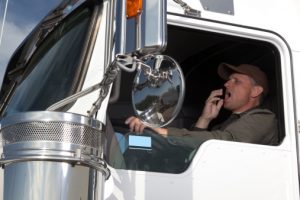Sleep Apnea Tests for Truck Drivers To Become More Common After Court Ruling
 Truck drivers who suffer untreated sleep apnea are five times more likely to be involved in a truck accident in West Virginia. That's according to a recent Harvard study, upon which the Federal Motor Carrier Safety Administration recommended (but has not yet required) testing for the condition for at-risk truckers. Now, more commercial carriers are likely to begin initiating sleep apnea testing for truckers after a U.S. Supreme Court decision not to review an appellate court ruling affirming an employer's right to do so.
Truck drivers who suffer untreated sleep apnea are five times more likely to be involved in a truck accident in West Virginia. That's according to a recent Harvard study, upon which the Federal Motor Carrier Safety Administration recommended (but has not yet required) testing for the condition for at-risk truckers. Now, more commercial carriers are likely to begin initiating sleep apnea testing for truckers after a U.S. Supreme Court decision not to review an appellate court ruling affirming an employer's right to do so.
Ultimately, this could mean fewer truck accidents in West Virginia, Ohio, Pennsylvania and beyond.
The U.S. Court of Appeals for the Eighth Circuit ruled in Parker v. Crete Carrier Corp. that plaintiff's trucker's civil rights under the Americans with Disabilities Act were not violated when the trucking company fired him for refusal to undergo sleep apnea testing after he was identified as being at risk, with a body mass index over 35. The FMCSA does not have any set-in-stone standards for sleep apnea tracking or testing, but in 2010 it did recommend truckers with a BMI over 35 be tested. (That standard has since been amended to say testing should be initiated for truckers with a BMI over 40 or a BMI over 33 if other risk factors, such as smoking, are present.)
What is Sleep Apnea?
Obstructive sleep apnea is a condition wherein the sufferer's breathing stops and starts over and over again in their sleep. There are different kinds of sleep apnea, but this is the most common. Truckers who are obese, consume a poor diet, smoke or have poor sleep patterns may be at the highest risk. Other risk factors include:
- Being over 40;
- Having a large neck size;
- Having a recessed chin, large overbite or small jaw;
- Having a family history of sleep apnea;
- A history of smoking or alcohol use.
Why Sleep Apnea is Dangerous for Drivers
Although many people who suffer from sleep apnea insist they don't fall asleep when they drive (and that could be true), the danger is in the fact that they may be excessively tired. That means even if they don't actually fall asleep, they are less alert. Their reaction times are slower. They may be more prone to distraction. These are not good traits behind the wheel of any vehicle. Behind the wheel of a semi-truck, it can be lethal.
The FMCSA is considering mandating sleep apnea screening for truckers, but until that happens, testing will be voluntary from carrier-to-carrier. Given that the Parker case found no issue with the trucker being required to pay for his own testing out-of-pocket (and the average testing cost is about $1,200), it's likely more carriers will start requiring this test - unless they are in desperate need of more drivers.
The good news is that most sleep apnea can be successfully treated, and drivers can regain their medically-qualified to drive status.
Still, some in the trucking industry have said such practices are "intrusive," and such practices violate federal privacy laws and industry standards that shield medical records and personal health data. However, unless the U.S. Supreme Court decides to take up another case on this issue or a different law is passed, we're likely to see more testing - not less.
